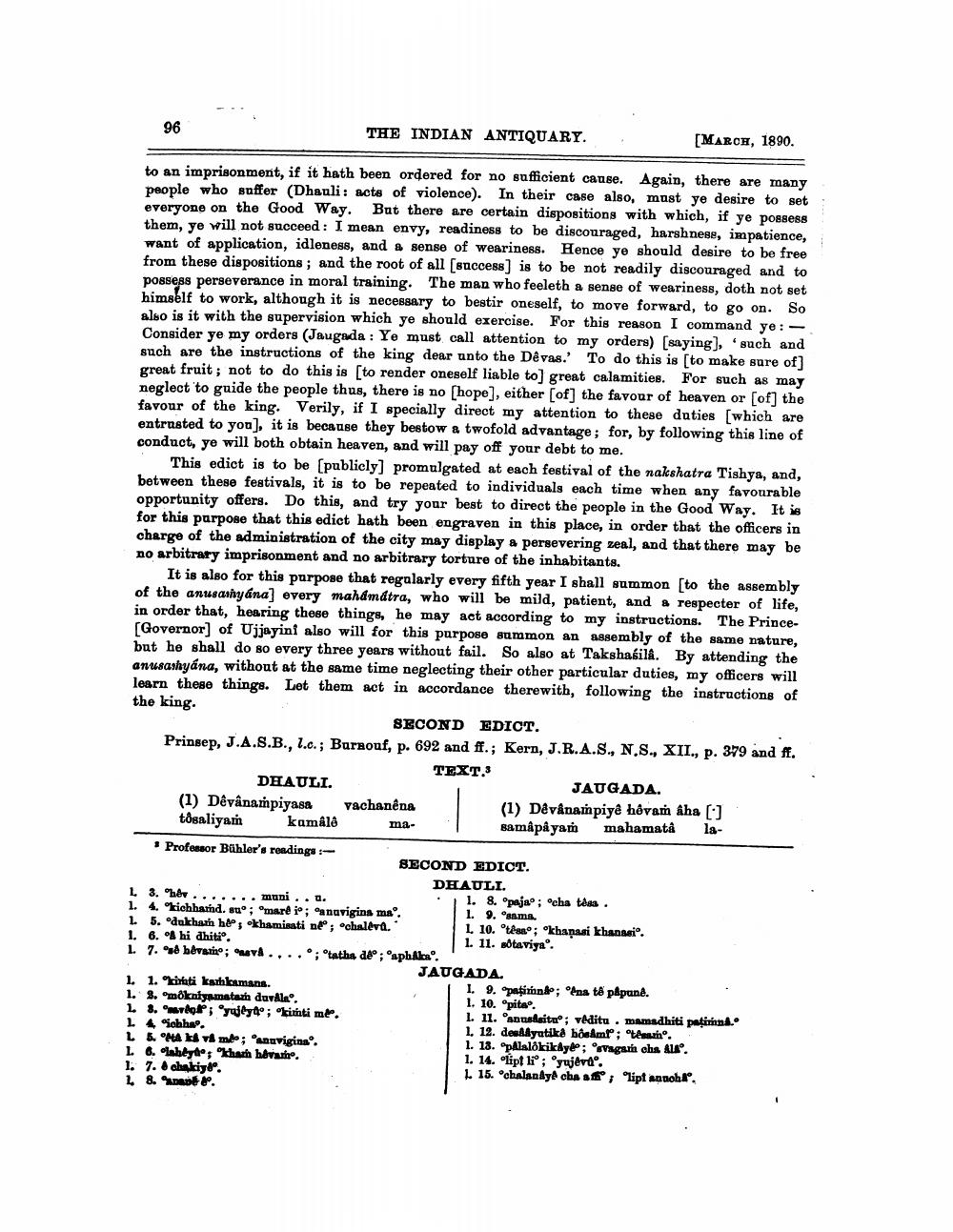________________
96
THE INDIAN ANTIQUARY.
[MARCH, 1890.
to an imprisonment, if it hath been ordered for no sufficient cause. Again, there are many people who suffer (Dhauli: acts of violence). In their case also, must ye desire to set everyone on the Good Way. But there are certain dispositions with which, if ye possess them, ye will not succeed: I mean envy, readiness to be discouraged, harshness, impatience, want of application, idleness, and a sense of weariness. Hence ye should desire to be free from these dispositions; and the root of all (success) is to be not readily discouraged and to possess perseverance in moral training. The man who feeleth a sense of weariness, doth not set himself to work, although it is necessary to bestir oneself, to move forward, to go on. So also is it with the supervision which ye should exercise. For this reason I command ye:Consider ye my orders (Jaugada : Ye must call attention to my orders) (saying), such and such are the instructions of the king dear unto the Devas. To do this is to make sure of] great fruit; not to do this is [to render oneself liable to] great calamities. For such as may neglect 'to guide the people thus, there is no hope], either [of] the favour of heaven or [of] the favour of the king. Verily, if I specially direct my attention to these duties (which are entrasted to you), it is because they bestow & twofold advantage; for, by following this line of conduct, ye will both obtain heaven, and will pay off your debt to me.
This edict is to be (publicly) promulgated at each festival of the nakshatra Tishya, and, between these festivals, it is to be repeated to individuals each time when any favourable opportunity offers. Do this, and try your best to direct the people in the Good Way. It is for this purpose that this edict hath been engraven in this place, in order that the officers in charge of the administration of the city may display a persevering zeal, and that there may be no arbitrary imprisonment and no arbitrary torture of the inhabitants.
It is also for this purpose that regularly every fifth year I shall summon [to the assembly of the anusasnyána] every mahdmátra, who will be mild, patient, and a respecter of life, in order that, hearing these things, he may act according to my instructions. The Prince[Governor) of Ujjayini also will for this purpose summon an assembly of the same nature, but he shall do so every three years without fail. So also at Takshasilê. By attending the anusashyána, without at the same time neglecting their other particular duties, my officers will learn these things. Let them act in accordance therewith, following the instructions of the king.
SECOND EDICT. Prinsep, J.A.S.B., 1.c.; Burnouf, p. 692 and ff.; Kern, J.R.A.S., N.S., XII., p. 379 and ff.
TEXT. DHAULI.
JAUGADA. (1) Dêvânampiyasa vachanêna
(1) Dévånampiyê hêvam kha ( tosaliyam kamalê ma
samapayam mahamatâ la• Professor Bühler's readings :
BECOND EDICT.
DHAULI. 1 3. "hey.......muni.. .
| 1. 8. Opajao; cha tesa. 1. 4. kichhamd. suo ; omare io; angvigins ma'. II. 9. sama. 1. 5. dukhanh héo, khamisati ne°; chaleva.
1. 10. °têgso; khanasi khanasio. 1. 6. & hi dhita.
1 11. stavigao. 1. 7. 8 bbvazino ; w ....°; tatha de°; Raphábs.
JAUGADA. 1 1. Pristati kathkamans.
I. 9. patindo; ena të papunë. 1. %. mokantysmata darila.
1. 10. Opits 18. marlot; rajdyto; kiti me.
I 11. 'anuslaitoo; veditu . mamadhiti putinni. 1.4 "obha.
1. 12. desAdyatika bôsamt° : nazno. L 6. 4 El vi mbo; snovigina'.
1. 13. palalókikdy ; 'svugar chs. Also. 16. shtyte; Lhath heran.
1. 14. lipt li°; yujërdo. 1. 7. & chaikido.
15. chalandye cha af lipt annohko. 18. not to




